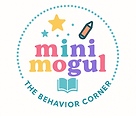Removing the "It's Just a Phase" from Aggression
- Tawana McNair, M.A., BCBA

- Nov 15, 2023
- 2 min read
Updated: Apr 9, 2025

Aggression is a Tool
A form of communication used to express desires by an individual!
Children sometimes outgrow forms of aggression that we see every day. Finding other forms of communicative levels that get them access to what they want versus engaging in what we see as negative behaviors (aggression).
It's not always helpful to respond to aggressive behavior in children. Sometimes, giving in to their demands in the past has only reinforced their aggressive tendencies. This means that the child may continue to use aggression as a means of communication since it has worked for them before.
Consider a baby crying in its crib. As parents, we typically check in to ensure the baby is okay. The baby learns that if they cry, mom or dad will come to their rescue. Similarly, when we respond to aggressive communication, we may inadvertently encourage it to happen again.
Tips to get out of the phase of aggression when the phase is prolonged
1. Help the child identify and express their emotions: Often, children resort to aggression when they don't have the words to express their emotions. Teaching them how to identify and express their feelings in a healthy way can help reduce their reliance on aggressive behavior.
2. Use positive reinforcement: Instead of punishing aggressive behavior, try rewarding positive behavior. This could be something as simple as praising the child for using their words instead of hitting or biting.
3. Be consistent with consequences: If you do need to discipline the child for aggressive behavior, be consistent with the consequences. This will help the child understand that their behavior has consequences and may discourage them from using aggression in the future.
4. Model positive behavior: Children learn by example, so make sure to model positive behavior yourself. If you get angry or frustrated, try to express your emotions in a healthy way, such as taking a deep breath or going for a walk.
5. Seek professional help: If the child's aggression is particularly severe or prolonged, it may be necessary to seek professional help. A therapist or counselor can help the child learn coping strategies and work through any underlying issues that may be contributing to their behavior.

If you need further assistance in reducing certain behaviors, please do not hesitate to get in touch with us.
Tawana McNair, M.A., BCBA
(475) 414 - 8084
www.thebehaviorcorner.org/consultation
Specializing in behavior reduction and replacement, developing positive
relationships, and advancing social relationships with peers and adults.




Comments